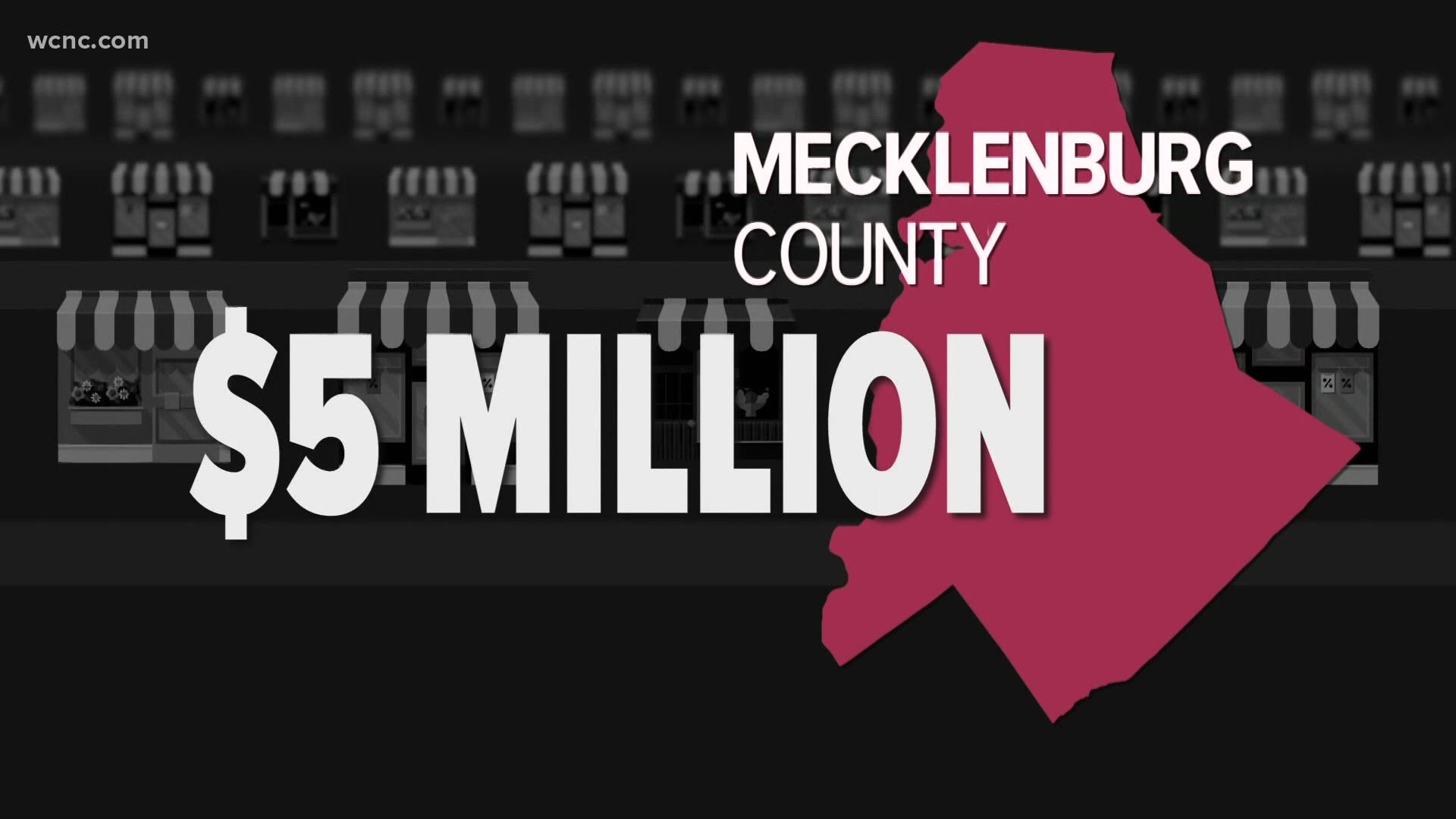MECKLENBURG COUNTY, N.C. — In their rush to help small businesses survive this pandemic, Mecklenburg County leaders okayed a $5 million emergency loan program that keeps them and the public in the dark about exactly who secures taxpayer-funded loans.
A Defenders investigation found no one in county government knows which businesses have received those taxpayer-backed low-interest loans since April.
Amid concerns raised by our investigation, three county commissioners have called for the release of all business names and dollar amounts loaned at Tuesday's Board of County Commissioners meeting.
By state law, the county had to hire a third-party to manage the Mecklenburg County Small Business Stabilization Loan fund, but by choice, the county handed over control of the specifics.
"We do not know of the specific names,” Mecklenburg County Director of Economic Development Peter Zeiler said. "I'm comfortable with it and I think taxpayers should be comfortable with it as well. We have a trusted partner."
That partner is the Carolina Small Business Development Fund. At the organization's request, the county agreed only that third party will hold the details and will not release them, Zeiler said.
President and CEO Kevin Dick said that decision is meant to protect businesses and make them feel comfortable enough to apply.
"We tell our borrowers that they have an expectation of privacy,” Dick said. "The disclaimers that we provide to our borrowers are what prevent us from (releasing details to the county)."
According to Zeiler, the county receives monthly and quarterly reports about the program. However, in those reports, he said business names are replaced by unique identifiers.
“We're trying to strike that balance of being transparent with the public, but also respecting the privacy and the identity of the borrowers, so they're not adversely affected by someone who does not have the full story of why they may have applied for that loan,” Zeiler said. "What we've seen in the past is sometimes if a small business gets their name out into the public and out into the press, occasionally, you'll have a vendor that says, 'Oh, they applied for a loan. They must be struggling. I'm going to retract credit that I have given them.'"
County Commissioner Pat Cotham said she is highly concerned by what she considers a lack of transparency.
"I am not happy about that,” Cotham said. "These are public dollars and I think that we should know that."
She has since requested the county manager “provide the names of the companies that have received loans and the amount of funding they received from the COVID-19 Small Business Emergency Stabilization Fund and provide the information by the district.”
Commissioners Trevor Fuller and Vilma Leake signed on as co-sponsors of the request.
Cotham is the only commissioner who voted against the loan program in April. At the time, she expressed concern about the $1 million the county agreed to pay the non-profit to manage and service the loans.
Now that she knows the county isn't tracking loan recipients, she said she's even more bothered.
“This makes it an even bigger obstacle for me,” she said. "The public has a right to know, so I'm always going to be on that side of the fence. I'm sure the best of intentions were all here, but sometimes we can rush things and not do the due diligence of how this is going to be perceived months later."
There's another public perception challenge. Auditors flagged the Carolina Small Business Development Fund, the third-party keeping track of the county's loans, just two years ago for recordkeeping of all things.
"How confident should we be in this third party, you all, monitoring this process?" WCNC asked Dick.
"You should be extremely confident,” he replied.
Dick, hired earlier this year, said the organization is much improved today.
"We've put a significant amount of controls in place with regards to loan documentation," he said.
In addition, Dick said county officials can move forward with audits of their own at any point along the way.
"Having the numeric identifier and then the ability to go in and audit at checkpoints is, to me, a good balance between public transparency as well as doing what you want the program to do," Zeiler said. "I think if we had told people right out the gate, 'Apply for this and we're going to tell everybody what your name is,' I don't think we would have gotten nearly as many applications and I'm not sure that we would have been able to help as many businesses."
After denying WCNC Charlotte's requests for loan specifics for months, with Cotham's help, the county gave us the only information available: a breakdown by industry and demographics of the businesses and their owners.
The seven-page document shows 186 businesses have received $4.1 million in loans so far and another 44 businesses that have received approval for an additional $700,000 in pending loan money.
Meanwhile, applications for 311 businesses were denied, according to the county's records.
In addition, the document shows professional, scientific, and technical services, food services and drinking places, personal and laundry services, and ambulatory health care services account for about half of the funded loans.
"It feels really good to be able to help businesses survive and get through," Zeiler said.
The data show women have secured a third of all loans and minorities have received more than half of them.
"We're overachieving we'll say on minority and women lending,” Zeiler said.
Of all the business owners securing loans, Eduardo Suarez is the only success story we know of. Five years into his American dream, COVID-19 nearly wiped out everything he worked so hard to build.
"I was very scared,” he said. "I remember in April being totally, totally upset with everything."
His marketing firm, Espanglish Marketing, connects businesses with Latino customers, but in the early days of the pandemic, he said those businesses stopped using his services.
"The most important thing was getting money (to survive)," he said.
Suarez said he applied for and received a low-interest county loan and in the months since his dream has grown. His business now has twice as many employees and clients, he said.
"It's amazing that I can continue with this dream that is my company,” Suarez said. "Right now, everyone is happy."
Mecklenburg County credits the loan program with saving almost 900 jobs and creating another 300 since April. The $5,000 to $35,000 loans are supposed to go to businesses with 50 employees or less.
Zeiler said so far, there is no evidence of any wrongdoing or fraud within the program.
"Mecklenburg County saw a great opportunity to step in and offer bridge support for small businesses and we were able to provide a good, targeted product that allowed a couple hundred small businesses to thrive and grow and be able to survive the pandemic, as well as keeping their employees and their families moving forward," Zeiler said. "It really is about keeping people employed and keeping the local economy moving. Each person that we can save on a job is money that is still circulating in the economy and helping keep other jobs afloat."
The county is using $6 million from its reserves to fund the loans and administrative costs. Businesses that received loans have up to 10 years to repay the money at a 3% interest rate. Zeiler said the Carolina Small Business Development Fund will collect 0.5% of all interest collected.
"We've got a little bit more capital left, so we are encouraging businesses to apply," Dick said.
County commissioners will meet at 5 pm Tuesday.


